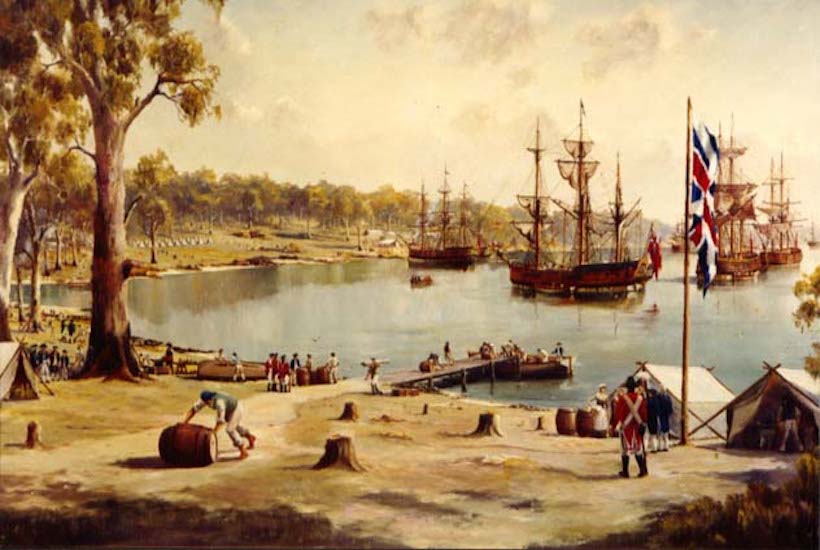There is no doubt that Stone Age hunter and gatherer societies, having ruled the roost for hundreds of thousands of years, have had a very lousy few centuries of late. Unfortunately, throughout human history, those less technologically advanced or less warlike have always suffered as a result of the contact with those more so.
Imperialism, conquest, displacement, slavery, extermination are neither white nor recent things; they have been practised by every race and every ethnicity in every corner of the globe. Europeans might have been the most recent and the most successful practitioners but they’re not the inventors. Just about everywhere around the globe, those colonised by the white imperialists were themselves imperialists and colonisers before first contact.
Just about… The hunter-gatherers have been the most prominent exception, since their societies have been too small and too scattered and isolated to create own empires like the Aztecs, the Incas, the Ashante, the Zulus, the Moghuls, the Chinese and countless others. Australian Aborigines, like the Plains Indians or the Amazonian tribes, have suffered nevertheless, dying in violence or much more often from the Indo-European diseases to which they had no immunity, displaced from their tribal lands and relegates to the lowest rung of the new colonial societies.
All that is a matter of historical record. But were there any alternative paths to the present?
The few isolated Amazonian or Papuan tribes that are still being discovered to this day in remote jungles are an exception and therefore not an example; their size and remoteness made them invisible and untouched until now. That the North American or Australian peoples could have survived until this or even the previous century in splendid isolation, continuing their traditional way of life until they were safe in the post-colonial age of more enlightened attitudes is a historical impossibility. Their lands were too accessible, too potentially rich and therefore too tempting for the exceedingly overcrowded and exceedingly competitive Europeans.
If Australia was not successfully and comprehensively colonised by the British, it would have been eventually by someone else: the Spanish, the Portuguese, the Dutch, the French, the Belgians, the Germans. And if Europe for some reason did not take off in the late fifteenth century, one of the Asian neighbours would have reached these shores at some point in an alternative history of the past half a millennium – maybe the Chinese, maybe the Malays, maybe the Muslim Indonesians – and claim the continent for their own tired, their poor, their huddled masses yearning to breathe free, the wretched refuse of Asia’s teeming shore.
I don’t envy Indigenous Australians their fate nor do I seek to deny or minimise what has been done to them over the past two and a half centuries. I merely doubt that any other conceivable historical scenario would have resulted in a happier history. Quite the contrary; to paraphrase that old imperialist Winston Churchill, the British colonialism was the worst thing that could have happened to Australia’s Aborigines except all those other forms that have been tried from time to time.
The British imperialism might not have necessarily been less bloody or less destructive of native societies than its competitors, but its ultimate outcomes have unquestionably been better for all concerned – or at the very least less worse. Compare and contrast former British colonies with all the other former European colonies and there is a better chance you will find reasonably stable democracies rather than poor and dysfunctional states. The “settler societies” like Canada, Australia and New Zealand are the pinnacles of development, with good governments, solid constitutional arrangements, prosperous economies, and respected rights and freedoms for the citizenry.
Yes, in all these countries – as well as in the United States, which decolonised itself a lot earlier – the first peoples lag behind the rest of the population in most health, social and economic indices, hence the desperate need to “close the gap” (changing the date of Australia Day and other symbolic gestures will do absolutely nothing towards that end), but they are still overall better off than in other former colonial countries and have better prospects of and opportunities for advancement than anywhere else. Would you rather be an indigenous former hunter and gatherer in Brazil, Namibia or Burma – or in Australia? You might still consider 26 January to be the Invasion Day, but history being what it is, it makes a hell of a difference who you were invaded and colonised by.
Just in case you doubt my white colonial privilege qualifies me in any way to judge, remember that in the past eighty years Poland has been invaded and colonised by both Nazi Germany and Soviet Russia. The former wanted to enslave and exterminate the sub-human Slavs, the latter to enslave and assimilate the Poles. Poland survived the 45 years of communism; it would not have survived the 45 years of fascism.
The past can be shit – in fact, in all sorts of ways it has been shit for an overwhelming majority of people for an overwhelming majority of human history – but there is a vast gradation of shit. Life in Australia before 1788 was not a prelapsarian idyll either, as often imagined by noble savage romantics; it was, to borrow from Hobbes, nasty, brutish and short, but it was the Aborigines’ own. Still, there is a chance that were [insert an alternative name for Australia] Day celebrated by one of those other potential colonists above on [insert an alternative date] today, there would be no one left to rally against the Invasion Day. It might not sound like much but it is.
Arthur Chrenkoff blogs at The Daily Chrenk, where this piece also appears.
Illustration: Wikimedia Commons.
Got something to add? Join the discussion and comment below.
Got something to add? Join the discussion and comment below.
Get 10 issues for just $10
Subscribe to The Spectator Australia today for the next 10 magazine issues, plus full online access, for just $10.


























Comments
Don't miss out
Join the conversation with other Spectator Australia readers. Subscribe to leave a comment.
SUBSCRIBEAlready a subscriber? Log in